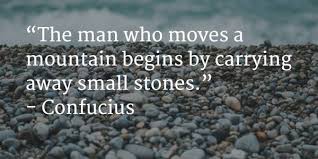From Chips to Cracks: Why Athletes Must Address Small Setbacks Before They Grow
“The man who removes a mountain begins by carrying away small stones.” – Confucius
Six months ago, a small rock hit our windshield during a highway drive, leaving behind a tiny chip about the size of a nickel. At the time, it seemed so insignificant that we didn’t bother addressing it. It wasn’t obstructing our view, so why spend the money or use insurance to fix something so minor?
Fast forward to this past weekend: subzero temperatures rolled in, and we had to travel two hours from home for my daughter’s three-day volleyball tournament. With our car parked outside in the freezing cold for 72 hours, that little chip decided it had enough. The pressure from the extreme cold turned it into a massive horizontal crack, stretching from one side of the windshield to the other. We were two hours from home, mid-holiday weekend, with no way to repair or replace it. Luckily, we made it back safely, but the experience got me thinking about athletes and how they handle small setbacks in their lives.
Like that chip in the windshield, small problems often seem harmless at first. But when left unaddressed, they can fester and grow into much larger issues, affecting an athlete’s performance, emotions, and overall well-being. It’s a lesson for all of us—athletes, coaches, and parents alike: Address the small problems before they grow into big ones.
The Pressure to “Suck It Up”
Young people often equate adulthood with toughness—believing that adults simply “suck it up” and move on. But the reality is, even small issues can weigh down adults if they’re not properly managed. The same holds true for teenagers. Left unchecked, a minor concern can spiral into an overwhelming emotional burden that disrupts their ability to thrive as students, athletes, and individuals.
This week, let’s explore a few practical strategies for parents, coaches, and administrators to help young athletes address their “chips” before they become “cracks.”
1. The Power of a Shared Journal
For parents: Consider keeping a shared journal at home that you and your child commit to writing in weekly. Choose a specific day each week for both of you to contribute. Encourage your child to write about something they’re excited or happy about and something that’s troubling them. As a parent, your role is to respond thoughtfully to their entries—validating their feelings, offering support, and creating an open dialogue when they’re ready to talk.
For coaches: Provide each of your players with a notebook or journal. Rotate through the team, having players share their thoughts periodically. This small act can create a powerful connection and show athletes that their concerns matter.
2. Unplug and Take a Walk
Sometimes the best conversations happen when distractions are removed. Set aside 30-60 minutes each week for a walk with your child. Use this uninterrupted time to ask about their week—school, friends, sports, or anything else on their mind. Share your own thoughts as well to model open communication. Walking not only provides physical benefits but also creates an environment where meaningful conversations can happen naturally.
3. Normalize Counseling
For many families, seeking counseling is a tough step, but it can be incredibly valuable. Whether your child is struggling or not, visiting a family counselor can demonstrate that seeking help is not something to fear. Even one session can help destigmatize the idea of counseling for your child, showing them it’s a healthy, proactive choice—much like eating a few carrots instead of a bag of chips. It’s a small investment in emotional well-being that can prevent larger issues down the road.
Be Proactive, Not Reactive
By addressing small problems early, we can prevent them from turning into major obstacles. Encourage your athletes to tackle their fears and frustrations before they fester. After all, dealing with a small chip is far easier—and less costly—than managing a crack that spans the entire windshield.
Take the time to help the young athletes in your life develop these proactive habits. With the right tools and support, they can learn to manage challenges effectively and grow into resilient, confident individuals.
If you’ve enjoyed this blog and want to dive deeper into understanding motivation and personal growth, check out my book, Significant Recruiting: The Playbook for Prospective College Athletes. It can be purchased through this link: https://coachmattrogers.com/book-significant-recruiting/.
Families and school administrators can also schedule a strategy session with me through this link: https://coachmattrogers.com/contact/#. Together, we can uncover what truly motivates you and help you achieve lasting success.






